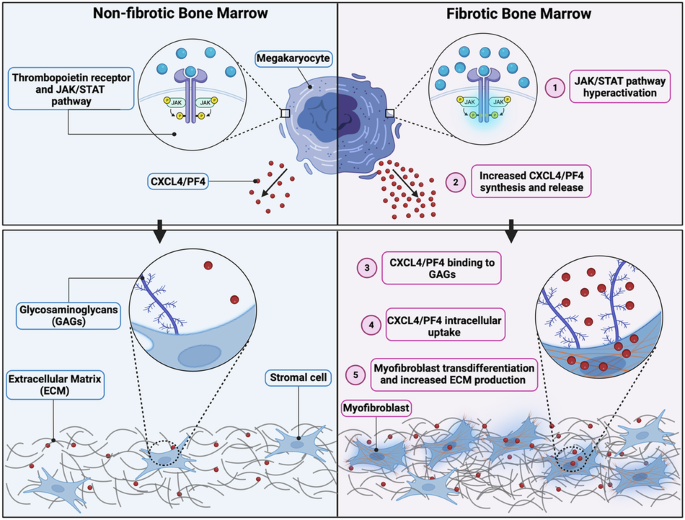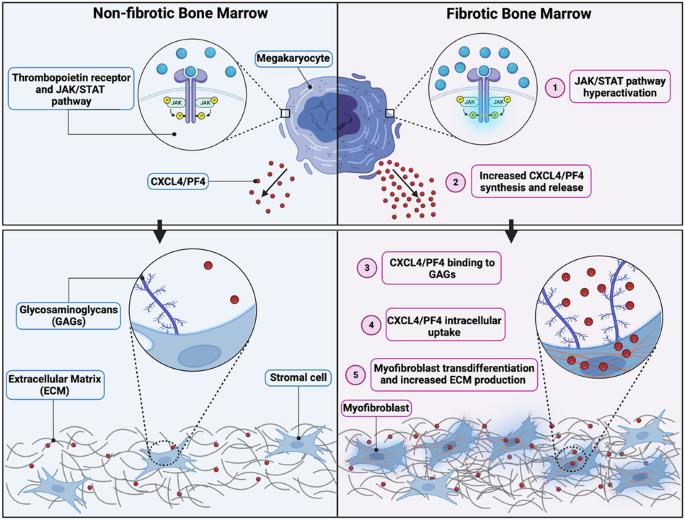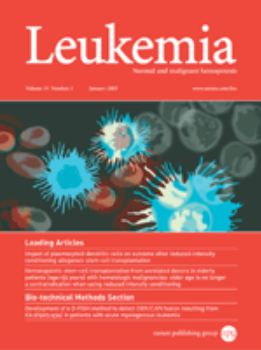蛋白质组筛选确定 PF4/Cxcl4 是骨髓纤维化的关键驱动因素。
IF 12.8
1区 医学
Q1 HEMATOLOGY
引用次数: 0
摘要
尽管人们对骨髓增殖性肿瘤(MPNs)的基因组情况有了更多的了解,但MPNs中巨核细胞(Mk)-间质异常串联和纤维化进展的病理机制仍不清楚。我们对罗米洛汀依赖性骨髓纤维化小鼠进行了基于质谱的蛋白质组学研究,以揭示信号通路的改变以及巨核细胞、血小板和骨髓(BM)细胞中蛋白质的变化。趋化因子血小板因子 4 (PF4)/Cxcl4 在所有蛋白质组中上调,在纤维化小鼠的血浆和骨髓液中增加。高浓度的TPO能维持体外PF4的合成和培养Mks中PF4的分泌,而Ruxolitinib能抑制体内PF4的异常表达。我们发现,PF4 可通过表面糖胺聚糖(GAGs)被基质细胞快速内化,从而促进肌成纤维细胞的分化。在TPO饱和的共培养条件下,Mks中的Cxcl4基因沉默可减轻基质细胞的坏死表型。同样,在经罗米波司他(Romiplostim)处理的 JAK2V617F 小鼠和骨髓增生性疾病患者的骨髓活组织切片中也发现了大量基质 PF4 吸收和 GAGs 沉积改变。患者的 BM PF4 水平和 Mk/血小板 CXCL4 表达均升高,且仅在明显纤维化时升高。最后,药物抑制 GAGs 可改善 Romiplostim 治疗小鼠的体内纤维化。因此,我们的研究结果突显了 PF4 在多发性骨髓瘤纤维化进程中的关键作用,并证实了中和 PF4-GAGs 相互作用的潜在治疗策略。本文章由计算机程序翻译,如有差异,请以英文原文为准。


Proteomic screening identifies PF4/Cxcl4 as a critical driver of myelofibrosis
Despite increased understanding of the genomic landscape of Myeloproliferative Neoplasms (MPNs), the pathological mechanisms underlying abnormal megakaryocyte (Mk)-stromal crosstalk and fibrotic progression in MPNs remain unclear. We conducted mass spectrometry-based proteomics on mice with Romiplostim-dependent myelofibrosis to reveal alterations in signaling pathways and protein changes in Mks, platelets, and bone marrow (BM) cells. The chemokine Platelet Factor 4 (PF4)/Cxcl4 was up-regulated in all proteomes and increased in plasma and BM fluids of fibrotic mice. High TPO concentrations sustained in vitro PF4 synthesis and secretion in cultured Mks, while Ruxolitinib restrains the abnormal PF4 expression in vivo. We discovered that PF4 is rapidly internalized by stromal cells through surface glycosaminoglycans (GAGs) to promote myofibroblast differentiation. Cxcl4 gene silencing in Mks mitigated the profibrotic phenotype of stromal cells in TPO-saturated co-culture conditions. Consistently, extensive stromal PF4 uptake and altered GAGs deposition were detected in Romiplostim-treated, JAK2V617F mice and BM biopsies of MPN patients. BM PF4 levels and Mk/platelet CXCL4 expression were elevated in patients, exclusively in overt fibrosis. Finally, pharmacological inhibition of GAGs ameliorated in vivo fibrosis in Romiplostim-treated mice. Thus, our findings highlight the critical role of PF4 in the fibrosis progression of MPNs and substantiate the potential therapeutic strategy of neutralizing PF4-GAGs interaction.
求助全文
通过发布文献求助,成功后即可免费获取论文全文。
去求助
来源期刊

Leukemia
医学-血液学
CiteScore
18.10
自引率
3.50%
发文量
270
审稿时长
3-6 weeks
期刊介绍:
Title: Leukemia
Journal Overview:
Publishes high-quality, peer-reviewed research
Covers all aspects of research and treatment of leukemia and allied diseases
Includes studies of normal hemopoiesis due to comparative relevance
Topics of Interest:
Oncogenes
Growth factors
Stem cells
Leukemia genomics
Cell cycle
Signal transduction
Molecular targets for therapy
And more
Content Types:
Original research articles
Reviews
Letters
Correspondence
Comments elaborating on significant advances and covering topical issues
 求助内容:
求助内容: 应助结果提醒方式:
应助结果提醒方式:


